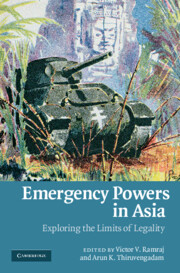Book contents
- Frontmatter
- Contents
- List of contributors
- Preface
- 1 Introduction: emergency powers and constitutionalism in Asia
- PART I Perspectives from legal and political theory
- PART II Postcolonial and post-conflict transitions
- PART III Emergencies, executive power and constitutional order
- PART IV The role of the courts
- Index
- References
1 - Introduction: emergency powers and constitutionalism in Asia
Published online by Cambridge University Press: 04 August 2010
- Frontmatter
- Contents
- List of contributors
- Preface
- 1 Introduction: emergency powers and constitutionalism in Asia
- PART I Perspectives from legal and political theory
- PART II Postcolonial and post-conflict transitions
- PART III Emergencies, executive power and constitutional order
- PART IV The role of the courts
- Index
- References
Summary
Introduction
The invocation of emergency powers by the state in response to a perceived crisis is the subject of considerable controversy in liberal democracies because these powers appear on their face to pose a direct challenge to the liberal ideal of constitutional government. Although emergency powers were the subject of constitutional theory long before the 11 September 2001 terrorist attacks in the United States, the 9/11 attacks and their aftermath have reignited debates about how established liberal democracies should respond to terrorist attacks and other sorts of emergency, leading to the development of sophisticated theories of emergency powers. Some of these theories defend a prominent, but qualified, role for the courts in checking the use of these powers. Others, mindful of the apparent deference to the executive shown by the courts in times of crisis, prefer to use constitutional or statutory emergency powers provisions to delimit the powers of the executive, often by subjecting them to stringent legislative procedures and oversight. Yet other theories stress the importance of extra-legal checks and the underlying social and political culture in preventing the abuse of executive power in an emergency. But what is the relevance of these debates and theories to the invocation of emergency powers in constitutional orders beyond the liberal democracies of ‘the West’?
The essays in this collection address this question, directly or implicitly, by drawing on the diverse emergency situations in Asia as a ready-made laboratory for exploring the relationship between emergency powers and constitutionalism.
Information
- Type
- Chapter
- Information
- Emergency Powers in AsiaExploring the Limits of Legality, pp. 1 - 18Publisher: Cambridge University PressPrint publication year: 2009
References
Accessibility standard: Unknown
Why this information is here
This section outlines the accessibility features of this content - including support for screen readers, full keyboard navigation and high-contrast display options. This may not be relevant for you.Accessibility Information
- 1
- Cited by
